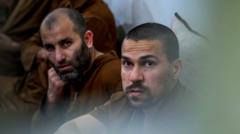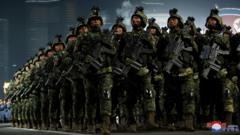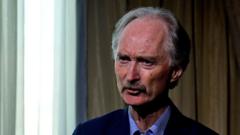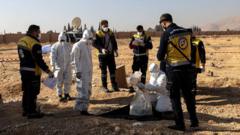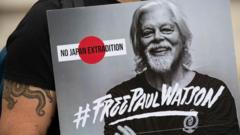In a recent turn of events, Nigeria's President Bola Tinubu has ordered the release of 27 teenagers who collapsed in court amid allegations of maltreatment during their detention. This decision comes in light of heightened public outrage and raises questions about the treatment of protest participants in the country.
Nigerian President Orders Release of Youths Detained for Protests After Court Incident
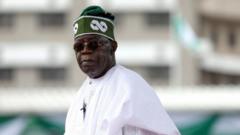
Nigerian President Orders Release of Youths Detained for Protests After Court Incident
Following a public outcry over the treatment of detained minors, Nigeria's President Bola Tinubu has intervened to ensure the release of a group of teenagers accused of treason.
The disturbing incident unfolded during the first court appearance of the minors, aged 14 to 18, who were among those arrested in connection with protests against government policies. Footage showing several of the youths collapsing due to apparent malnourishment ignited a national conversation regarding their treatment while in custody. President Tinubu responded swiftly, directing officials to release the minors, which was facilitated by the dropping of treason charges against them, according to reports from the Information Minister Mohammed Idris.
These young people had been detained for nearly three months following protests linked to Nigeria's deepening economic crisis and a movement known as #EndBadGovernance. Public demonstrations had escalated into violence, resulting in various casualties, and spurring authorities to detain hundreds of participants, raising concerns about human rights abuses and the conditions within detention facilities.
Bayo Onanuga, a spokesperson for President Tinubu, emphasized that while the youths' release is a welcome development, it does not interfere with ongoing legal processes regarding the protests. The government has also been urged to formulate a plan for the safe reintegration of these minors back into their families.
Human rights organizations, including Enough is Enough and Amnesty International, condemned the detention of these children, labeling it as an egregious violation of their rights and a grim reflection of Nigeria's approach to dissent. As investigations into their prolonged detention commence, this incident has reinvigorated discussions about the treatment of young protestors and the importance of upholding human rights amidst civil unrest.
The fallout from this incident reveals a critical moment for Nigeria as it grapples with balancing civil liberties and state security, while also confronting the broader challenges of governance and public dissatisfaction.
These young people had been detained for nearly three months following protests linked to Nigeria's deepening economic crisis and a movement known as #EndBadGovernance. Public demonstrations had escalated into violence, resulting in various casualties, and spurring authorities to detain hundreds of participants, raising concerns about human rights abuses and the conditions within detention facilities.
Bayo Onanuga, a spokesperson for President Tinubu, emphasized that while the youths' release is a welcome development, it does not interfere with ongoing legal processes regarding the protests. The government has also been urged to formulate a plan for the safe reintegration of these minors back into their families.
Human rights organizations, including Enough is Enough and Amnesty International, condemned the detention of these children, labeling it as an egregious violation of their rights and a grim reflection of Nigeria's approach to dissent. As investigations into their prolonged detention commence, this incident has reinvigorated discussions about the treatment of young protestors and the importance of upholding human rights amidst civil unrest.
The fallout from this incident reveals a critical moment for Nigeria as it grapples with balancing civil liberties and state security, while also confronting the broader challenges of governance and public dissatisfaction.








